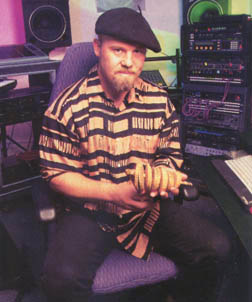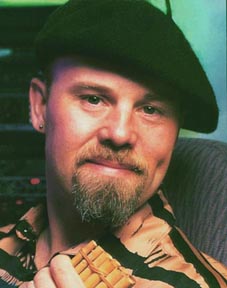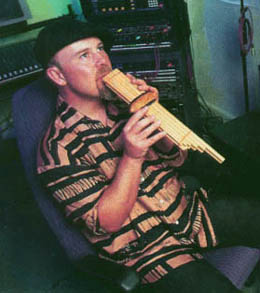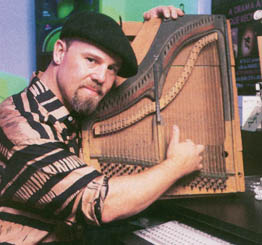| |
|
Beatnik technology for modern musicians
on the Internet:
"To transpose a melody up a minor third is not computationally
very intensive, so most of what the composer is doing in
the compositional stage doesn't require a lot of computer
power to do.
"What requires a lot of computer power, though, is
when you hit a site where you're downloading or streaming
audio - to actually put this rich digital recording over
a telephone line - and replay it on a user's machine. So,
it seemed to me that if everyone in my audience had Studio
Vision and a sampler on their computer, then it would be
great. All I would have to send was the recipe instead of
the whole damn wedding cake. They would hear the music instantaneously
with no quality loss over the way I was hearing it. They'd
hear it with fidelity. I would have some guarantee that
what they were hearing was what I intended."
|
however... "In the instance of general MIDI,
where you can't account for what sound card they have or how
that's going to sound, or for streaming audio where there are
just so many factors, like available bandwidth, the amount of
server activity, there seems to be very little quality control
involved in what kind of loss you get. You get glitches, you
get dropouts, you get complete stops where you have to restart
it, and I hate the idea of people listening to my music in that
light. So what I built for myself and for others was a way that
I can create and it'll come out sounding pretty much the way
that I intended it. You're playing back linear files that people
have created, and one of the aims of RMF (Rich Music Format)
is to give the composer, if he or she has a set way that they
want the public to hear the music, a guarantee that it will,
indeed, sound that way."
Beatnik's Rich Music Format: a multi-use compression
protocol that can, in a single file, stream MIDI, digital audio,
and a 40-bit data-encryption algorithm (for adding copyright
information to that file) simultaneously. It can crunch large
files down to very manageable sizes the way MPEG does, but with
the added function of performing several duties at once, all
within the same file.
|
|
Favorites:
Musicians: "Van Morrison, Joni Mitchell, Frank Zappa,
George Clinton, David Bowie, Brian Eno... I think in some ways especially
Eno, because he manages to juggle art and commerce incredibly well
like Leonardo DaVinci did. DaVinci invented the drum machine and the
helicopter, but also managed to paint the Mona Lisa. Eno managed to
create ambient music yet still be at the commercial peak of U2, Talking
Heads, Devo, Bowie, and so many other people."
Producers: "There are a few producers I admire for what
they do. I think Trevor Horn's a great producer. I hated working with
him because he's a maniac. He manages to make everybody feel very,
very dispensable by virtue of the fact that he's got six studios on
the ball at any one time. You might play a part and he would just
take a four-bar loop of that and do a whole remix with it in another
room. I didn't like that very much. At the other end of the spectrum,
I think Mutt Lange is a great producer as well. He's quite the opposite
- he'll never commit to a single note unless he's convinced it's going
to end up in the song. But he can sometimes be frustrating because
he'll make you play a 16-note melody all night. So he's a real perfectionist...
I also really like William Orbit. He's a purist programmer and producer
who's done a lot of his own stuff and stuff for other people. There's
a lot of people I respect, but I'm not a generalist."
Music: "I don't like most music. I like a very small
percentage of the music that I hear in any genre. Two percent of classical
music that I hear, I adore, and it makes me want to go and learn to
orchestrate stuff like that. Then if you took an average piece of
successful or popular classical music it sounds to me like somebody
saying 'two plus two equals four, two plus two equals four'. And yes,
we have reassured ourselves over and over again that the planets will
revolve."
Coffee: "It depends on what time of day it is. Usually
after a meal I like a black espresso. Usually in the morning I like
a double cappuccino."
|



